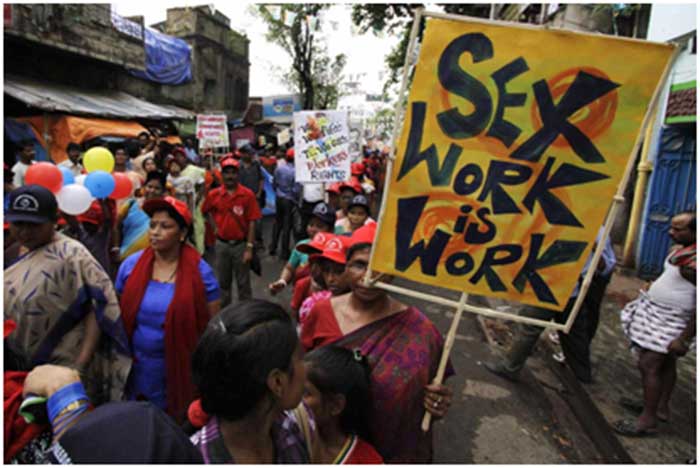
Covid-19 presents a new muddle and risks for sex workers, pandemic of poverty has affected the lives of sex workers; Desperation has kicked in for vulnerable, undocumented workers unable to access help, it has left them with distress, uncertainty, with social distancing rules getting more stringent there is a fear of losing livelihood, health issues troubling, as sex work is intimate by its very nature, and workers are at heightened risk of contracting the virus if they keep working. But without work, as strip clubs close and clients dwindle, sex workers struggle to survive. In the midst of pandemic they are working, nobody wants to work in hazardous profession due to lockdown regulation, but survival is a major issue, they have no support from other parts. The pandemic has brought an era of uncertain days for sex workers, pre-existing inequalities, has disproportionately affected them as the communities live outside societal protection mechanisms, often in financially precarious situations. The cost of Covid-19 pandemic is highly expensive on the part of sex workers, and they struggle to survive it.
The Fragile Existence of Sex Workers During the Pandemic
Paid sexual labour is a form of employment that most people generally don’t think about. From street workers to escorts to exotic masseuses, jobs in the sexual services industry have been disrupted during the coronavirus pandemic that is, if they wish to keep themselves safe. The Convention on the Elimination of all Forms of Discrimination against Women (1979) safeguards the right of female sex workers against discrimination but there is a lack of safety protocols for women. Street prostitution is one of the most dangerous professions in the world, already associated with high risks of abuse and sexually transmitted diseases. Now, adding to those hazards is the coronavirus. The sex workers are plunged into poverty, scarcity of customers, which leads to no remuneration, poor housing conditions and ultimate uncertainty. Being a sex worker is isolating and the social distancing have led to another form of isolation. Extending a red light closure has pushed them into perils of marginality vulnerability and stigmatisation. Desperation forces sex workers into the risk of Covid-19.They are criminalized and left without any governmental support during this era of distancing. With no income, no food, no shelter they are pushed into the brinks of hunger and violence. There is a lack of safety net for the workers. Challenges and barriers to work in these times are quite consequential.
Gendered and Racist Prostitution
Sex workers are often from groups that are already marginalized economically and socially, such as undocumented migrants, people of color, and lesbian, gay, bisexual, and transgender (LGBT) people, some of whom have been pushed out of their families due to homophobia. Sex work may, for them, be one option among bad ones. A new report by the International Committee on the Rights of Sex Workers in Europe (ICRSWE) notes that sex workers in the continent live in the “economic margins” and often have less savings and government support to fall back on. They are also plans. The ICRSWE report also predicts that hard economic times may mean more people will turn to sex work. Brothels exist everywhere in the social distancing era, the transgender prostitutes do suffer as they don’t have any means of livelihood, due to stereotyping of transgender in our country are completely ignored in some way or the other. With client’s gone women, men and transgender suffer from destitution as their livelihood is affected. They are more afraid of hunger than the virus. In the longer term, as the ICRSWE argues, governments should carry out meaningful consultations with sex workers to establish a framework that “respects their human rights and improves their safety and working conditions.”LGBTQ sex workers do suffer from huge ostracization due to the pandemic. Color has become an ideal type of discrimination among the Trans people and they have been also questioned about the national identity. Homophobia and Transphobia are some of the significant prejudices which are experienced by the sex workers.
The Prostitute, the virus and the City
The pandemic has affected the entire industry and the workers, sex workers struggle to make ends meet as coronavirus spreads as they are at corona cross roads there is an immediate need to address their issues. Brothels are fined for staying open during the pandemic, so some have taken recourse to online mode of prostitution but that too has not been sustainable enough. The pandemic has been tough for many sex workers, and the post lock down era can brings new challenges. On anonymity a sex worker said that taking into account the corona protocols proper hygiene is taken into account. There is a need for empowering the civil society groups who can come forward to rescue them. There are many still active NGO’s which are working but still there is need of proactive steps to empower them from the crisis.
Dr.Nupur Pattanaik, Teaching Sociology, Department of Sociology, Central University of Odisha
SIGN UP FOR COUNTERCURRENTS DAILY NEWS LETTER










































